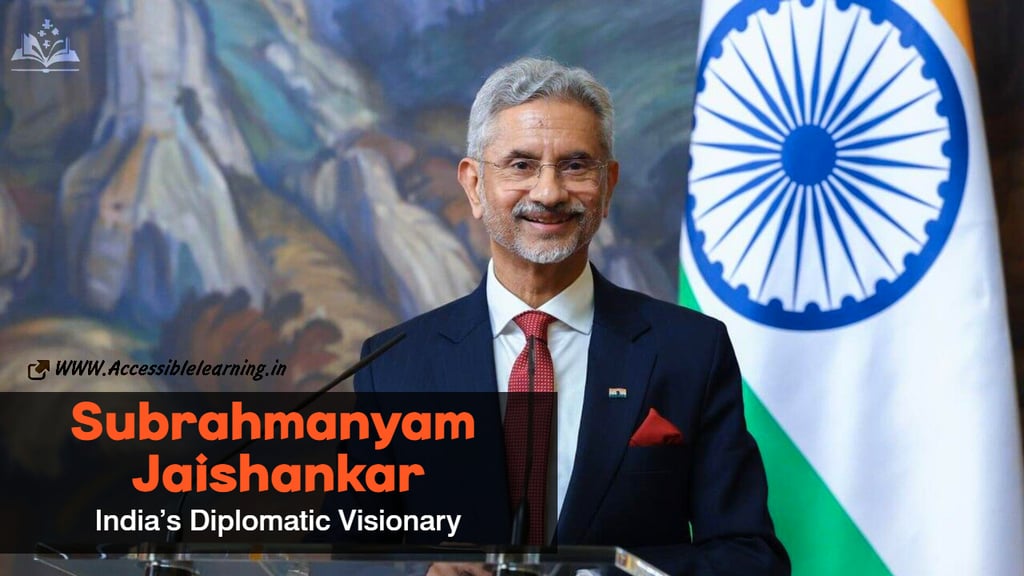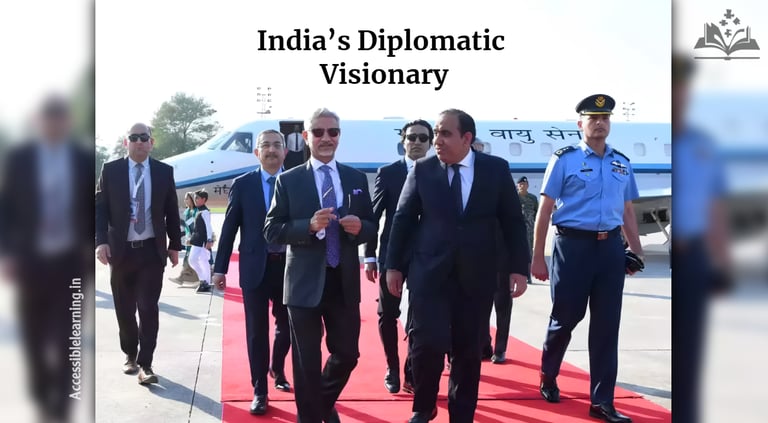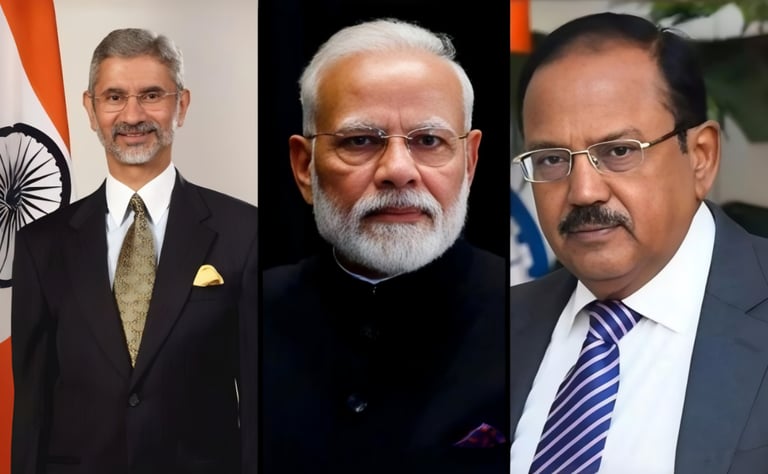
S. Jaishankar's Legacy: India's Global Diplomatic Leader?
Subrahmanyam Jaishankar, India's visionary External Affairs Minister, has played an instrumental role in shaping India's foreign policy and strengthening its global presence. From his diplomatic legacy to his influence in global governance, this article delves deep into Jaishankar’s remarkable career, highlighting his contributions to India’s international relations and his leadership on the global stage. Discover how Jaishankar’s strategic foresight has defined India’s position in world affairs and its growing influence in the digital age.
THE GREAT LEADEREDUCATION/KNOWLEDGEINDIA/BHARATBIOGRAPHY/HISTORY
Sachin K Chaurasiya
12/5/202410 min read


Subrahmanyam Jaishankar (सुब्रह्मण्यम जयशंकर जी), commonly known as S. Jaishankar, has firmly established himself as one of the most influential diplomats in contemporary Indian politics. Serving as the Minister of External Affairs since May 2019, Jaishankar's approach to diplomacy has been characterized by clarity, strategy, and a deep understanding of global geopolitics. This article delves into his remarkable career, diplomatic philosophy, and the significant role he plays in shaping India's foreign policy today.
Early Life and Family Background
Subrahmanyam Jaishankar (सुब्रह्मण्यम जयशंकर जी) was born into a family with a strong legacy of service and intellectual pursuit. His father, K. Subrahmanyam, was a highly regarded defense analyst and strategic thinker, contributing significantly to India’s defense and national security policies. Growing up in such an intellectually stimulating environment naturally shaped Jaishankar’s worldview and inspired his path toward the Indian Foreign Service (IFS).
Educational Background and Early Career!
Jaishankar’s academic journey, coupled with the influence of his father’s work, nurtured a deep curiosity for global affairs and international relations. His ability to combine academic rigor with practical diplomatic experience has played a critical role in shaping India's foreign policy under his leadership.
Subrahmanyam Jaishankar’s educational journey has been integral to shaping his career as a diplomat and policymaker. He holds an M.A. in political science from the prestigious Jawaharlal Nehru University (JNU), a university known for its strong emphasis on international relations and foreign policy studies. This academic foundation laid the groundwork for his future career, as it exposed him to key issues related to global politics, security, and diplomacy.
Jaishankar went on to earn a doctorate in international relations from Jawaharlal Nehru University (JNU), further solidifying his academic credentials. His dissertation focused on US-India relations, highlighting his early interest in understanding the dynamics of international partnerships, especially in the context of India’s strategic positioning.
Jaishankar joined the Indian Foreign Service (IFS) in 1977, marking the beginning of his illustrious diplomatic career. His early years were spent honing his skills in various diplomatic assignments, including in Moscow, Singapore, and Washington, where he gained a deep understanding of the geopolitical landscape.
Contributions to Indian Foreign Policy as Foreign Secretary!
As Foreign Secretary of India (2015–2018), Jaishankar played an essential role in advancing India’s diplomatic agenda, navigating complex global issues with finesse. His tenure was marked by an assertive yet balanced foreign policy, seeking to enhance India's influence across the globe.
One of his significant contributions during this period was his role in improving ties with the United States. The U.S.-India relationship has been one of India's most vital strategic partnerships, and Jaishankar worked tirelessly to strengthen this, particularly in terms of defense and technology cooperation. His adept handling of the Civil Nuclear Agreement between the two countries paved the way for greater economic collaboration and trust.
Jaishankar also oversaw India’s response to significant international challenges, including issues in Afghanistan and Pakistan. His strategic vision in managing India’s concerns over Afghanistan's security and the increasingly complex relations with Pakistan demonstrated his keen diplomatic judgment and his emphasis on India’s security priorities.
Strategic Vision on Multilateral Platforms!
Jaishankar has been a staunch advocate for India's broader role on the world stage. Under his leadership as Foreign Secretary, India’s foreign policy emphasized multilateralism, engaging in global forums such as the United Nations, the World Trade Organization, and the G20, among others. He has persistently argued for reforming global institutions, particularly the United Nations Security Council (UNSC), where India has long sought a permanent seat.
During his time as Foreign Secretary, Jaishankar was instrumental in shaping India’s stance on climate change and sustainability. He pushed for greater cooperation on environmental issues, advocating for stronger commitments from developed countries while ensuring that India’s development goals were not compromised. This approach helped India assert its leadership in global environmental conversations while balancing national priorities.

Jaishankar’s Role in Strengthening Bilateral Ties
Jaishankar’s diplomatic career has been marked by the strengthening of bilateral relationships with countries across the globe, particularly in Asia, Europe, and North America.
India-China Relations
As India’s Ambassador to China (2009–2013), Jaishankar faced significant challenges in managing the often-tense relations between the two countries. He was part of India’s team during crucial negotiations on border issues and trade imbalances, and his ability to navigate the complex terrain of diplomacy between the two nuclear powers was a defining feature of his tenure. His nuanced understanding of Chinese politics and culture played a key role in keeping India’s relationship with China stable, despite ongoing territorial disputes.
U.S.-India Relations
As Foreign Secretary and later as External Affairs Minister, Jaishankar took steps to elevate India’s relations with the United States. The U.S. remains one of India’s most important strategic allies. Jaishankar was particularly active in fostering defense and economic partnerships, playing a pivotal role in defense agreements such as the Logistics Exchange Memorandum of Agreement (LEMOA), which strengthened defense cooperation between the two nations.
India-Russia Relations
Despite the changing geopolitical dynamics, Jaishankar has been a vocal advocate of India’s ties with Russia, particularly in defense, energy, and strategic interests. His tenure as Foreign Secretary saw India continuing to benefit from its long-standing relationship with Russia, even as India deepened ties with other global powers.
India-Japan Relations
Another area where Jaishankar’s expertise and strategic outlook were evident was in strengthening relations with Japan. The India-Japan Special Strategic and Global Partnership was significantly elevated during his tenure. His role in fostering closer economic, technological, and defense ties with Japan is considered a cornerstone of India’s “Act East” policy.
Leadership in Crisis Situations
One of Jaishankar's most defining traits is his ability to lead with composure during times of crisis. His calm and strategic approach was particularly evident during events such as the Doklam Standoff with China in 2017 and the Pulwama Attack in 2019, which escalated tensions between India and Pakistan. His capacity to handle these sensitive situations with a steady hand and diplomacy without escalating tensions reflected his strong leadership skills.
During the COVID-19 pandemic, Jaishankar’s leadership was instrumental in not only securing India’s vaccine supply chains but also in strengthening ties with the global community to facilitate aid and medical supplies. His diplomacy ensured that India remained engaged with both its neighbors and key partners in addressing the global health crisis.
Personal Characteristics and Leadership Style?
Jaishankar’s leadership is often described as cerebral, diplomatic, and pragmatic. His quiet confidence, paired with his thorough preparation and meticulous attention to detail, has earned him respect both within India and internationally. While diplomatic discussions often require patience and resilience, Jaishankar’s ability to stay composed under pressure has set him apart as a seasoned diplomat.
His ability to read global trends and predict the direction of international relations is another one of his strengths. He has been a critical voice in reshaping India’s foreign policy in a rapidly changing world. Jaishankar is also known for his commitment to clarity and transparency in communications, both in personal interactions and in public speeches.
A highly articulate individual, Jaishankar is well-regarded for his speeches and public statements, which often reflect deep intellectual engagement with global issues. His speeches at global forums like the UN and BRICS Summits are marked by their diplomatic elegance, sharp insights, and an unwavering emphasis on India’s role as a key global player.
Distinguished Diplomatic Service!
Jaishankar’s distinguished career spans more than four decades in the Indian Foreign Service. He has served in various high-profile positions, including as India's Ambassador to the United States (2013-2015) and India’s Ambassador to China (2009-2013), both crucial assignments that shaped his strategic vision for India's foreign policy.
In his role as India’s Ambassador to the U.S., Jaishankar played a pivotal role in strengthening the U.S.-India relationship, particularly after the Civil Nuclear Agreement of 2008. He navigated the complexities of Indo-U.S. relations during a time when the two countries were redefining their partnership, moving from a historical stance of suspicion toward closer cooperation on issues such as counterterrorism, nuclear nonproliferation, and trade.
As ambassador to China, Jaishankar was tasked with managing one of the most challenging diplomatic relationships for India. The India-China relationship has always been multifaceted, with a combination of cooperation, competition, and territorial disputes. Jaishankar’s tenure saw significant developments in border negotiations, as well as attempts to increase trade and economic cooperation between the two nations. Despite challenges, Jaishankar's experience and expertise were crucial in managing the delicate balance between cooperation and competition with China.


Jaishankar’s Role in India's "Neighborhood First" Policy
In addition to his global engagements, Jaishankar has been instrumental in furthering India's "Neighborhood First" policy. This policy prioritizes India's relationships with its neighboring countries, recognizing that regional stability and security are essential to India's broader geopolitical goals.
Jaishankar has emphasized that India’s immediate neighbors, including Sri Lanka, Bangladesh, Nepal, Bhutan, and the Maldives, are integral to India’s foreign policy framework. By nurturing these relationships, he has worked to bolster regional cooperation on issues such as trade, security, and environmental sustainability. Jaishankar’s diplomatic acumen has helped India enhance ties with South Asian nations, positioning India as a leader in promoting peace and development in the region.
His approach to the Maldives crisis in 2018, where India played a pivotal role in restoring democratic governance, exemplified his commitment to maintaining India’s leadership in South Asia. Similarly, his efforts to enhance India’s relationship with Bangladesh have helped elevate the strategic partnership between the two nations, particularly in the fields of trade and counterterrorism.
Advocacy for India’s Role in Global Governance?
Jaishankar’s foreign policy vision has also been centered on India’s role in global governance. He has consistently pushed for the reform of global institutions, particularly the United Nations Security Council (UNSC), where India has long advocated for a permanent seat. His calls for a reformed multilateral system have made him a leading voice in international forums.
During his tenure as Foreign Secretary and now as External Affairs Minister, Jaishankar has highlighted the need for greater inclusivity in global decision-making processes. He has argued that the existing structures, largely shaped by post-World War II dynamics, no longer represent the realities of the modern world, with emerging powers like India and others in the Global South deserving a seat at the decision-making table. His stance on this issue underscores his belief that a reformed international order is essential for maintaining peace, prosperity, and security in a rapidly changing world.
Technology Diplomacy and Digital Cooperation
In addition to traditional diplomatic concerns, Jaishankar has also embraced the digital revolution and its implications for global governance. Under his leadership, India has actively engaged in international discussions on cybersecurity, the digital economy, and the regulation of emerging technologies. He has advocated for global cooperation on issues such as artificial intelligence (AI), data privacy, and technology-driven economic growth.
Jaishankar’s engagement with global tech leaders and multilateral bodies has helped position India as a significant voice in the digital space. His diplomatic efforts have been pivotal in ensuring that India’s interests in the global tech ecosystem are represented in forums like the G20 and World Economic Forum (WEF).
Recent Global Engagements
Since becoming India’s External Affairs Minister in 2019, Jaishankar has continued to spearhead India’s engagement with the world on a broad range of issues. His diplomatic skill and global reach have been on full display in key international interactions, such as the Quad Summit, the BRICS Summit, and India’s responses to the ongoing Russia-Ukraine war.
Jaishankar’s role in the Quad, a strategic partnership between the United States, Japan, Australia, and India, has been particularly important in countering growing Chinese influence in the Indo-Pacific region. He has been instrumental in driving the Quad’s agenda on maritime security, counterterrorism, and economic cooperation, emphasizing a free and open Indo-Pacific.
Personal Attributes and Global Recognition?
Jaishankar’s diplomatic career has earned him recognition both in India and globally. He has been widely regarded as one of India’s most articulate and strategically minded diplomats. His ability to think on his feet, engage in complex negotiations, and articulate India’s position on the global stage has earned him respect from international leaders and diplomats alike.
Jaishankar’s public demeanor is marked by a calm yet firm approach. His speeches, often infused with deep intellectual insights, reflect a nuanced understanding of international relations. He is well-known for his directness, coupled with the ability to navigate sensitive issues with tact and diplomacy. His candid approach to foreign policy discussions, especially when addressing complex global challenges, has further solidified his reputation as a thought leader in Indian diplomacy.


Challenges in the Changing World Order!
As India’s foreign policy has evolved, Jaishankar has had to grapple with challenges arising from the changing global order. In particular, the rise of China’s influence, both regionally and globally, has presented significant challenges for India. Jaishankar’s strategic vision has been crucial in balancing India’s own rise while managing competition and cooperation with China.
The Russia-Ukraine war and the ongoing shifts in global power structures have also required Jaishankar to recalibrate India’s diplomatic approach. India has maintained a delicate balance, advocating for peace and dialogue while aligning with the broader global community on issues of human rights and international law.
Jaishankar’s Vision for India’s Global Role!
Looking to the future, Jaishankar’s vision for India’s global role is clear: India should rise as a global leader, not just in regional matters, but as a key player in shaping the future of the international system. This vision is built on India’s ability to leverage its strategic location, growing economic strength, and democratic values to form lasting partnerships with countries across the world.
As the world faces new challenges, whether in the form of climate change, global health, security issues, or the shifting global economy, Jaishankar's strategic thinking will continue to guide India’s diplomatic efforts. His leadership in crafting a robust foreign policy will ensure that India is at the forefront of global peacekeeping, economic collaboration, and technological innovation.

Subrahmanyam Jaishankar Ji’s diplomatic career is marked by exceptional leadership, intellectual depth, and strategic vision. From his early years in the Indian Foreign Service to his influential role as the Minister of External Affairs, Jaishankar has played a crucial part in shaping India’s foreign policy. His contributions have not only strengthened India’s bilateral and multilateral relationships but have also elevated India’s status as a global power.
As the world enters an era of intense geopolitical competition, S. Jaishankar’s balanced, forward-thinking, and pragmatic diplomacy will continue to guide India in asserting its role on the world stage. His legacy as one of India’s most accomplished diplomats is cemented, and his influence will likely shape the course of India’s foreign policy for many years to come.
Subscribe To Our Newsletter
All © Copyright reserved by Accessible-Learning Hub
| Terms & Conditions
Knowledge is power. Learn with Us. 📚


